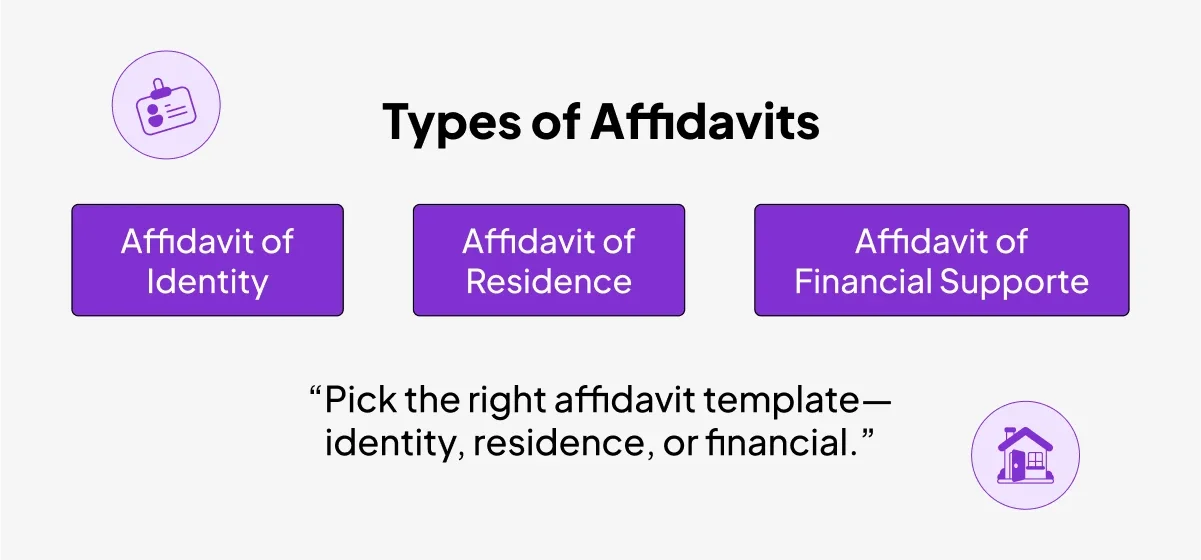Affidavits are documents that represent a solemn declaration of truth by the person who signs them. They are used across different areas of law, including civil, criminal, and family law, making them a versatile tool in the legal system.
Whether you're involved in a court case, a business transaction, or a personal matter requiring legal documentation, having a firm grasp of what an affidavit entails will empower you to navigate these situations with confidence.
And if you ever need to get that affidavit drafted, signed; without the printer/scanner back and forth—ZoopSign’s eSign and eStamp digital workflows have you covered.
But let's break it down in simpler terms.
What Is an Affidavit?
An affidavit definition simply is a written statement that is confirmed by oath or affirmation, used as evidence in court. In essence, it's a document where you formally swear that the information you provide is true. This sworn statement is made under penalty of perjury, meaning that if the information is found to be false, the affiant could face legal consequences.
Today, many affidavits move online. Platforms like ZoopSign let you draft your sworn statement, share it for review, and collect Aadhaar-based eSignatures, all in one secure space
Read: Important Legal Laws Of eSignatures In India!
The Basics of Affidavits
The word "affidavit" comes from Latin, meaning "he has declared upon oath." It's a legal tool used in various legal proceedings and is generally required to be notarized to be valid. A notary public's role is to ensure that the person making the affidavit (the affiant) is who they claim to be and is signing the document willingly. This notarization process is crucial because it adds a level of authenticity and credibility to the document.
Affidavits are utilized in many contexts, from court hearings to administrative processes. They are often required when a verbal statement is not sufficient or practical, serving as a written record that can be referred back to. The versatility and reliability of affidavits make them an essential component of the legal toolkit, relied upon by courts, lawyers, and individuals alike to establish facts or support claims.
Key Components of an Affidavit
- Title: The document is titled "Affidavit" and may include a brief description of its purpose. This helps to immediately identify the document and its intent.
- Introduction: This section includes the affiant's name, address, and sometimes occupation. It establishes the identity of the person making the statement, which is crucial for the document's credibility.
- Statement of Truth: A declaration that the information provided is true to the best of the affiant's knowledge. This section underscores the seriousness of the document, as it holds the affiant accountable for the truthfulness of their statements.
- Body: Contains numbered paragraphs detailing the facts the affiant is swearing to. Each paragraph should cover a single point to maintain clarity and organization, allowing the document to be easily understood and referenced.
- Signature and Date: The affiant signs and dates the document. This step signifies the affiant's acknowledgment of the document's contents and their willingness to be bound by them.
- Notary Section: Includes the notary's signature, seal, and the date of notarization. This finalizes the document's legal standing and prepares it for submission or use in legal matters.
Why Are Affidavits Important?
Affidavits play a crucial role in the legal system by providing a written, sworn statement of fact. They are used in various situations, such as:
1.Legal Evidence
Affidavits are often used as evidence in court cases. Because they are sworn documents, they carry weight in legal proceedings. For instance, in family law, an affidavit might be used to provide evidence of financial status or child care arrangements. This can be pivotal in decisions regarding custody or support, influencing the court's rulings.
Moreover, in civil litigation, affidavits can support motions or serve as evidence during trials. They provide a way for parties to present their version of events or corroborate other pieces of evidence without having to testify in person, which can be beneficial in streamlining legal processes and focusing on the core issues at hand.
2.Verification of Identity
In some cases, affidavits can serve to verify a person's identity or verify signature. This is particularly common in business transactions or when someone needs to prove their identity without other forms of identification. Such affidavits can be vital in situations where official documents like passports or IDs are not available or have been lost.
Furthermore, in real estate or financial transactions, affidavits can be used to confirm the legitimacy of signatures on important documents, ensuring that agreements are made between the correct parties. This adds a layer of security and trust to the transaction, protecting all involved parties from potential fraud or disputes.
3.Supporting Documents
Affidavits can support other documents, like contracts or wills, by confirming the truth of certain statements. They offer a method for individuals to attest to the accuracy of documents without having to appear in court. This can be especially useful in estate planning, where affidavits may be used to verify the intentions of the deceased, thereby preventing potential conflicts among heirs.
In business, affidavits may accompany contracts to affirm that all terms are understood and agreed upon, reducing the risk of future disagreements. By serving as a supplementary assurance, affidavits enhance the reliability and enforceability of legal affidavit.
How to Create an Affidavit
Creating an affidavit involves a few simple steps. Here's a guide on how you can draft one:
Step 1: Gather Information
Before drafting an affidavit, gather all necessary information and evidence related to the statement you need to make. This includes documents, dates, and any other relevant details. The more comprehensive your information, the stronger your affidavit will be.
It's crucial to ensure that all information is accurate and verifiable. Cross-check facts and gather supporting documents to back up your statements. This preparatory step sets the foundation for a credible and effective affidavit.
Step 2: Write the Statement
Draft the affidavit form by clearly stating the facts in a logical order. Use simple language and number each paragraph for clarity. Ensure that each statement is factual and based on personal knowledge. Avoid using hearsay or assumptions, as affidavits must be based on the affiant's direct experiences.
Be concise but thorough, providing enough detail to convey your points effectively. This will help the reader understand the context and significance of your statements, enhancing the affidavit's impact.
Pro tip: Use ZoopSign’s template to pre-fill common sections (name, address, intro) so you never miss a required field.
Step 3: Review and Edit
Review the affidavit for any errors or unclear statements. It's important that the document is accurate and concise. Consider having someone else review it as well. A fresh set of eyes can catch mistakes you might have missed and suggest improvements.
Pay attention to the language used, ensuring it is formal and appropriate for a legal document. Clarity and precision are key, as any ambiguity could weaken the affidavit's effectiveness in legal proceedings.
Step 4: Notarization
Visit a notary public to have the affidavit notarized. The notary will verify your identity, witness your signature, and apply their seal to the document. This step is crucial for the affidavit to be considered valid in legal settings. Without notarization, the affidavit may not be accepted by courts or other entities.
Choose a reputable notary to ensure the process is conducted correctly. Proper notarization adds legal weight to the document, affirming its authenticity and the integrity of the statements made.
Different Types of Affidavits
There are several types of affidavits, each serving a specific purpose. Here are a few common ones:
1.Affidavit of Identity
Used to verify a person's identity, often required in legal name changes or when applying for certain documents. This affidavit can be essential in cases where traditional identification methods are insufficient or unavailable.
An Affidavit of Identity may also be required when individuals need to establish their identity for financial or legal transactions, ensuring that they are recognized as the rightful party in various dealings.
2.Affidavit of Residence
Confirms a person's residence, typically used in school enrollments or legal disputes involving property. This type of affidavit can be crucial in proving residency for purposes such as school district eligibility or voting registration.
In real estate transactions, an Affidavit of Residence can help confirm ownership or occupancy status, which may be necessary for resolving disputes or finalizing property sales.
3.Affidavit of Financial Support
Commonly used in immigration processes, this document confirms that an individual will financially support another person. It is a critical component in visa applications, demonstrating that the applicant will not become a financial burden on the host country.
Such affidavits can also be used in family law cases to establish financial responsibility for dependents, ensuring that their needs are met by the supporting party.
Common Mistakes to Avoid
When preparing an affidavit, there are several common mistakes to avoid:
- Inaccurate Information: Ensure all information is accurate and up-to-date. False information can lead to legal consequences. Double-check facts and sources to maintain the document's integrity.
- Vague Language: Use clear and specific language to avoid misunderstandings. Ambiguity can weaken the affidavit's effectiveness and lead to misinterpretation of the statements made.
- Lack of Notarization: Failing to have the affidavit notarized can render it invalid. Make sure to complete the notarization process to uphold the document's legal standing.
- Omitting Details: Include all necessary details to provide a complete and accurate statement. Missing information can lead to questions about the affidavit's reliability, potentially undermining its intended purpose.
- Avoid version mix-ups: ZoopSign’s version control means every edit you make is timestamped and backed up automatically.
Understanding affidavits is crucial for anyone involved in legal proceedings or needing to provide a sworn statement. These documents serve as a vital tool in verifying facts and supporting legal cases. Whether you need an affidavit for court evidence, identity verification, or financial support, knowing how to prepare one accurately is essential.
By following the steps outlined in this guide, you can ensure that your affidavit is properly drafted and holds up in any legal situation. Remember, when in doubt, consult with a legal professional to ensure your affidavit meets all necessary requirements. Properly prepared affidavits not only protect your interests but also contribute to the fair and efficient operation of the justice system.
Ready to make your affidavits foolproof? Try ZoopSign’s free plan—draft, eSign, eStamp, and track your affidavit all in one place.

